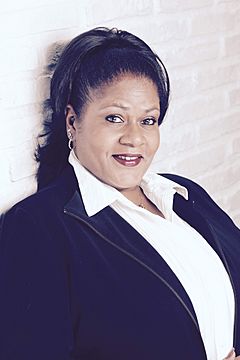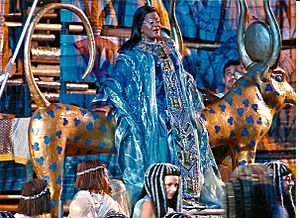Tichina Vaughn facts for kids
Quick facts for kids
Tichina Vaughn
|
|
|---|---|

Tichina Vaughn American Mezzosoprano
|
|
| Born |
Tichina Vaughn
19 September 1965 Baltimore, United States
|
| Education | North Carolina School of arts Georgia State University Metropolitan Opera young artists program |
| Occupation |
|
| Awards | Kammersängerin, Staatstheater Stuttgart |
Tichina Vaughn (born September 19, 1965) is an American opera singer. She is a mezzo-soprano, which means she has a powerful, deep female singing voice. Tichina Vaughn has performed in operas, concerts, and recitals all over the world.
She started her career at the Metropolitan Opera in New York City. Later, she became a main singer at famous opera houses in Europe, like the Semperoper in Dresden and the Stuttgart Opera. In 2006, she received a special award called Kammersängerin in Stuttgart, which means "Chamber Singer." This title is given to very talented opera singers.
Tichina Vaughn is known for her strong and rich voice. She often sings important roles in operas by famous composers like Verdi, Wagner, and Strauss. Some of her well-known roles include Amneris in Aida, Eboli in Don Carlo, and Azucena in Il trovatore. Critics have described her voice as "enchanting" and full of "great intensity."
Contents
Early Life and Training
Tichina Vaughn was born in Baltimore, Maryland. She grew up in Winston-Salem, North Carolina. She started singing at just six years old in her church choir. As she grew older, she also learned to play the clarinet and performed in school bands.
After high school, Tichina Vaughn began to study singing seriously. She trained with famous teachers like Florence Kopleff at Georgia State University. She also studied at the University of North Carolina School of the Arts. In 1987, she was a finalist in a singing competition in Austria. She earned her bachelor's degree in vocal performance in 1989.
American Career Highlights
Tichina Vaughn began her professional singing journey in a special training program at the Metropolitan Opera in New York. She joined this program after winning the Metropolitan Opera National Council Auditions in 1989. She made her first appearance on the Met stage in 1990.
Her first main role was Amneris in Verdi's opera Aida at the Seattle Opera in 1992. This was a big success! It led to many invitations to sing Aida in other cities like Detroit and Hong Kong. This helped her become known as a talented young mezzo-soprano for Verdi's operas. She also sang Princess Eboli in Don Carlos and performed in Verdi's Requiem in South America.
International Performances
Since the late 1990s, Tichina Vaughn has performed all over the world. She often sings in Italian operas, but she also added many German roles to her list. People have praised her performances, saying she brings great emotion and a powerful voice to her characters. For example, her role as Klytemnestra in Elektra was described as "deeply harrowing."
From 1998 to 2006, Tichina Vaughn was a main singer at the Staatsoper Stuttgart in Germany. She made her European debut there in 1996. In 2006, she was given the special title of Kammersängerin. While in Stuttgart, she sang many important roles, including Azucena in Il Trovatore and Fricka in Wagner's Die Walküre. She also recorded some of her performances there.
From 2010 to 2018, Vaughn was a main artist at the Semperoper in Dresden, Germany. Here, she continued to sing famous roles like Azucena, Venus, and Ortrud in Wagner's Lohengrin. She also performed in operas like Rusalka and Die Fledermaus.
She first performed at the famous Arena di Verona in Italy in 2003. She returned there many times, singing the role of Amneris in Aida. She has also sung Ulrica in Verdi's Un ballo in maschera on many stages around the world, including in San Francisco and Dresden.
Her performance as Azucena in Il Trovatore has been called "full-blooded" and powerful. She has sung this role in Greece, Hungary, and Italy.
Tichina Vaughn has also performed in Gershwin's opera Porgy and Bess. She sang three different roles in this opera at the Metropolitan Opera, the Kennedy Center, and the Teatro alla Scala in Italy. She has also been a guest artist at other major opera houses, such as the Los Angeles Opera and the Finnish National Opera.
Concert Performances
Besides opera, Tichina Vaughn also performs in concerts. She has sung with major orchestras like the Atlanta Symphony Orchestra and the Taipei Symphony. She has performed in famous venues like the Elbphilharmonie Hamburg and the Kennedy Center.
She often gives recitals, which are concerts where she sings with just a piano. She is also a talented jazz and gospel singer.
Personal Life and Teaching
Tichina Vaughn was married to singer Derrick Lawrence from 1992 to 2007, and they have two children. In 2015, she was recognized as a "Role Model Beyond Beauty" for her career achievements and for giving back to her community. She has received many awards from important music foundations, including the Metropolitan Opera National Council and the Richard Tucker Foundation.
Tichina Vaughn is also a dedicated singing teacher. She regularly teaches masterclasses, which are special lessons for advanced students, in Europe and the United States. She has taught at the Metropolitan Opera and in North Carolina. She is also an associate professor of Voice at the Jacobs School of Music in Bloomington.
Recordings
Tichina Vaughn has released several recordings:
- 2005: Christmas at My House
- 2006: Stuttgarter Ring Cycle (a collection of Wagner's operas)
- 2012: Schwanda, der Dudelsackpfeifer
- 2019: Porgy and Bess (from the Metropolitan Opera)
She has also appeared in video recordings of operas like Puccini's Il Tabarro and Wagner's Die Walküre.
 | Madam C. J. Walker |
 | Janet Emerson Bashen |
 | Annie Turnbo Malone |
 | Maggie L. Walker |


